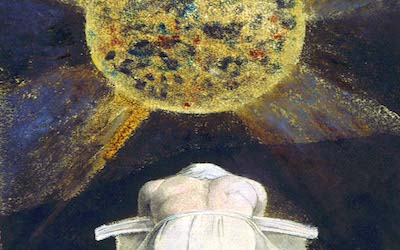Blake's Critique of Critique

Research Lounge, Room 552, Arts West (Building 148), Parkville campus
MapProfessor Peter Otto
‘Blake’s (Romantic) critique of Critique and reinvention of Imagination’
Stephen Pinker’s Enlightenment Now (2018) is the most prominent amongst the recent books proposing a return to the Enlightenment as antidote to populism, fake news, sectarianism, hyperreality, and so on. Even if one is attracted to this argument, when one opens these books it is surprising to find the extent to which ‘Enlightenment’ is imagined as a European adventure and how scrupulously the matter of Romanticism is ignored. The latter appears, if at all, as the antagonist of Enlightenment—a retreat from reason, science, objectivity, and universality to imagination, immersion, emotion, and difference. The disease infecting the contemporary world has its source, it seems, not just in postmodernism, but in Romanticism.
It is true, of course, that during the late 18th and early 19th century many of modernity’s ‘master-tropes . . . were . . . subjected to incisive critical and methodological reflection and revaluation’. But most would now agree that this revaluation ‘extends the project of European modernity’, and to that extent also of the Enlightenment, ‘while offering itself as a sustained critical reflection on that very process’ (Pfau and Mitchell, 2012). Seen in this light, Enlightenment and Romanticism, critique and creativity, reason and imagination, fact and fiction are much more closely entangled with each other than is normally allowed.
These remarks provide the point of departure for this paper, which explores the complex exchanges between reason and imagination, and critique and creativity, as represented by William Blake’s All Religions are One (1788), There is No Natural Religion (1788), and The Book of Los (1795). Blake might seem a poor choice for this topic, given that he is supposed to champion the life of Imagination against the dead hand of Reason. But, as I shall argue, it is Blake’s critique of Imagination and, more particularly, of the revolutionary Imagination celebrated in All Religions are One and There is No Natural Religion, that informs his critique of religious and Enlightenment Reason, which in turn sets the stage for the (Romantic) reinvention of imagination elaborated in his later poems. As I shall argue in conclusion, it is this remarkable re-envisioning of reason and imagination, and of their relation to each other, that brings Blake’s oeuvre most powerfully into dialogue with the present.
Short Biography
Peter Otto is Professor of Literature at the University of Melbourne, Executive Director of the Research Unit in ‘Enlightenment, Romanticism, and Contemporary Culture’, and a member of the Australian Academy of the Humanities. His publications include Blake’s Critique of Transcendence (OUP, 2000); Gothic Fiction: A Microfilm Collection of Gothic novels (Adam Matthew, 2002-3); Gothic Fiction: A Guide (Adam Matthew, 2003); Entertaining the Supernatural: Mesmerism, Spiritualism, Secular Magic and Psychic Science (Adam Matthew, 2007); Multiplying Worlds: Romanticism, Modernity and the Emergence of Virtual Reality (OUP, 2011); Innovations in Encompassing Large Scenes (Romantic Circles, 2013); and William Blake. 21st Century Oxford Authors (OUP, 2018). He is currently completing a book on ‘William Blake, Secularisation, and the History of Imagination’, while also working on a project, funded by the ARC, on ‘Architectures of Imagination: Bodies, Buildings, Fictions, and Worlds’.